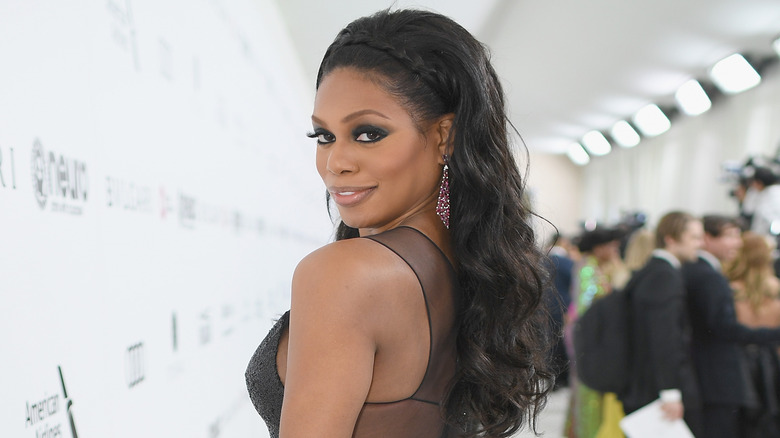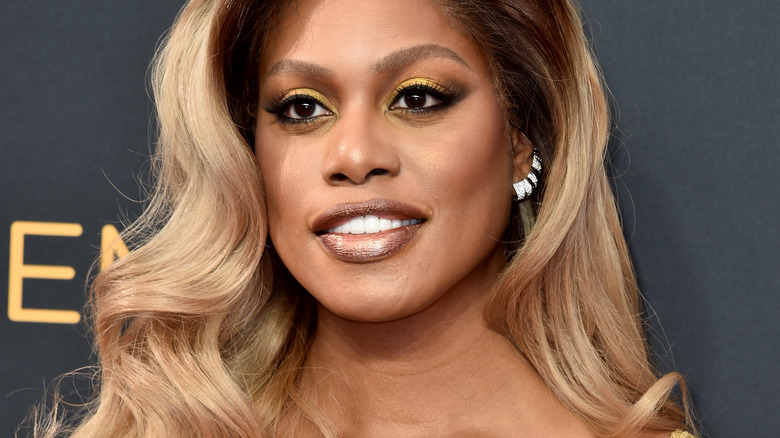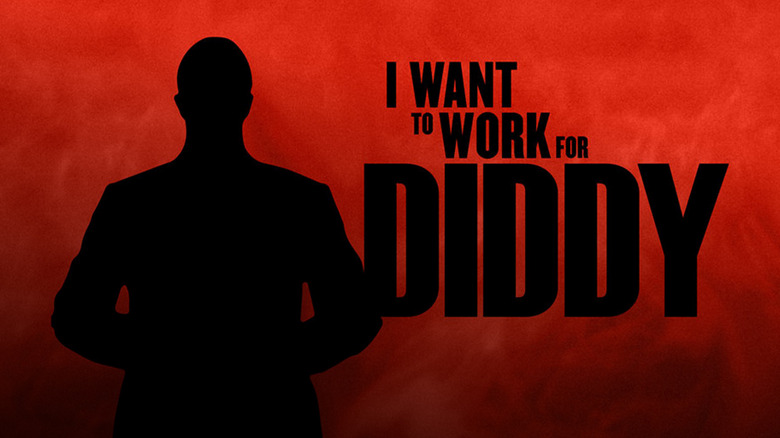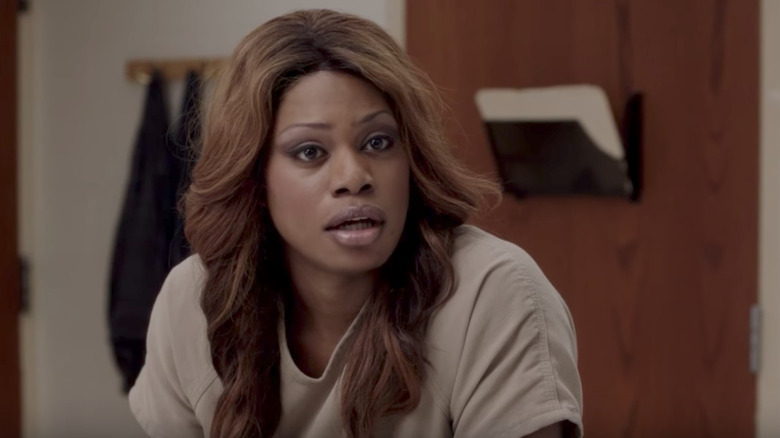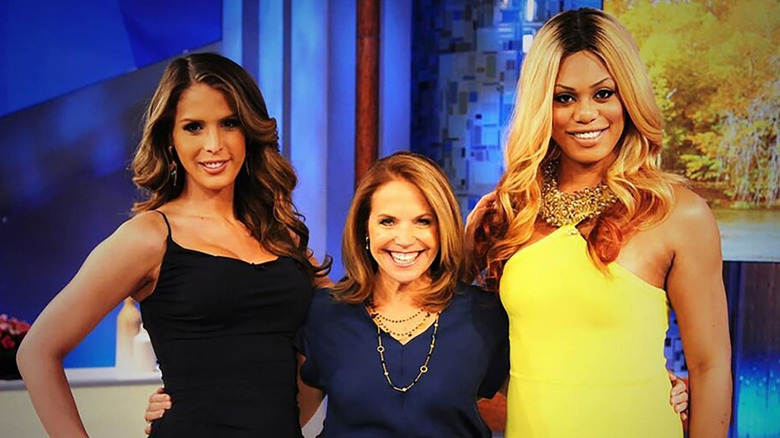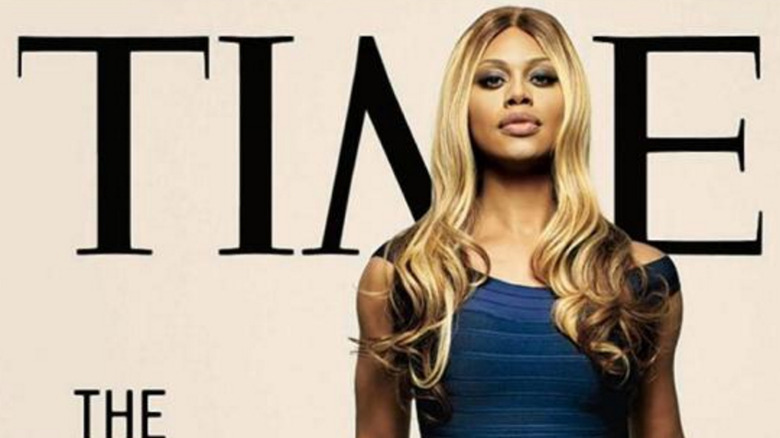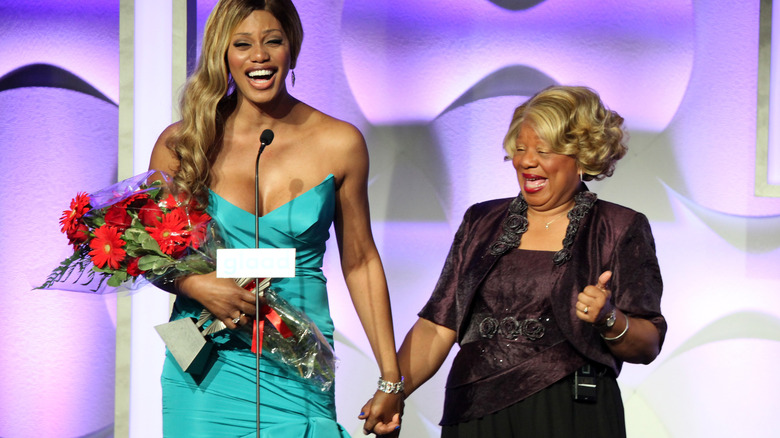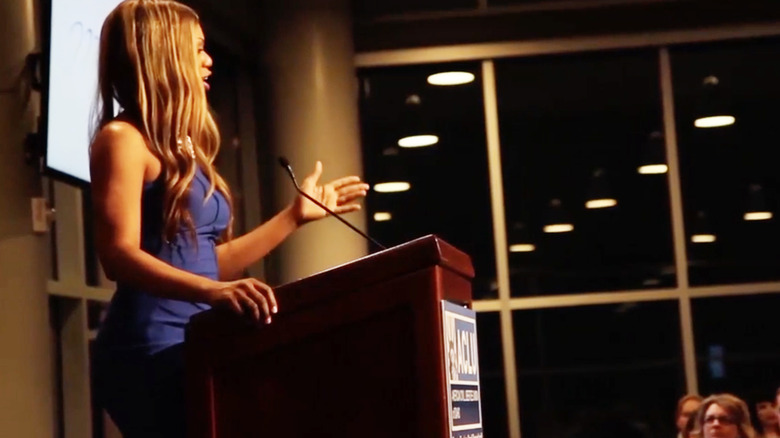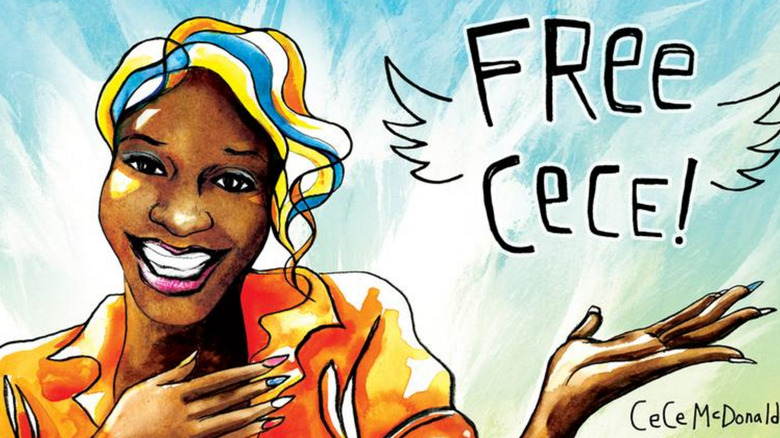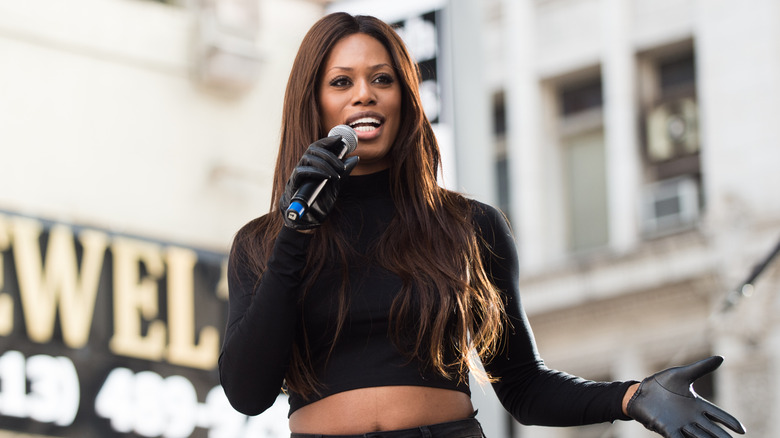How Laverne Cox Pushed The Boundaries In Hollywood
Laverne Cox is now a household name, but it didn't always used to be that way. Like many trans people, she struggled and fought her entire life to feel accepted by society.
Now that she's finally broken through the Hollywood barrier, she uses her talents as an actress, and her eloquence, to continue to fight for trans rights and awareness. But how exactly did she manage to reach a spot in the limelight that thousands of other people only dream about?
Struggling to get cast
In an March 2017 interview with Backstage, Cox recalls the days when she was first starting out as an actress and auditioning for roles. Despite the glamour of Hollywood, it is no secret that people are often typecast, and that sexism and racism still exist in the entertainment industry. Cox experienced this firsthand as she went from audition to audition, being met with "horribly offensive" scripts and with people who simply didn't understand how to handle a trans person. Many directors didn't want to hire her simply because of who she was. But where other people might have given up, she kept pushing.
For Cox, her persistence and resilience came from a certain concept of what it really means to be trained as an actor. "That's the thing about being an actor," she told Backstage. "In a lot of ways, we want love and acceptance...You have to work on the self-acceptance, self-love stuff, the shaming stuff, the trauma stuff...And that is part of the training process." Despite countless rejections and mistreatments, Cox pressed on until she finally landed a role on VH1's reality TV show, I Want To Work For Diddy, which led to appearances on network shows like Law & Order.
From then on, she would not only keep working hard to improve life for herself, but to improve the lives of other trans people, through her advocacy work.
Changing the reality TV game
When you think of reality TV, it's likely that screaming, backstabbing, and an overdose of drama all come to mind. However, when Cox landed a role on VH1's 2008 reality blitz, I Want To Work For Diddy, she didn't succumb to those low standards. While she would later emerge as a figure of poise and class, she was exhibiting those unshakable traits, even then.
In 2014, Cox told BuzzFeed that from the very beginning, she wasn't going to sacrifice her values. Despite the producers of the show wanting to incite conflict between the women, Cox insisted that she wouldn't stoop beneath her standards. "I remember being really conscious of not wanting to fight with another black woman on camera," she said. As a black trans woman, Cox felt like there had been enough damage already done, pitting black women against each other for the sake of mindless entertainment. She chose not to place herself in the stereotype of the angry or overly dramatic black woman on the show. Even when Cox was eliminated from the show's competition, she held her composure. And her resolve hasn't diminished since.
Making Emmy history
Cox really rose to fame as Sophia Burset on the Netflix original, Orange Is The New Black. The critically acclaimed series is known for its very real, sometimes heartbreaking and violent portrayal of women's struggles. While the show takes place in a women's prison, its storylines and characters have universal appeal.
Cox's character on the show is a trans woman, just like herself, and as such, viewers are made to bear witness to the harassment that often befalls her character, because of it. To Cox, this role has been especially important because it reflects the dark reality that many trans people live every day. As an actress, portraying trans woman and bringing awareness to trans issues has always been her priority.
Because of her outstanding performance on OITNB, Cox was nominated for an Emmy, the first such nomination for an openly trans actor — ever. When she first learned of her nomination, she shared a statement with the Huffington Post. "As I celebrate this day," she said, "I can't help but remember it is still a state of emergency for far too many trans people across this country right now. We need love, and support. We need public policy and our fellow citizens to value our lives and our humanity." With every role and every accomplishment, Cox always insists that it is not just about herself, but about the larger population, who is in need of help and awareness.
Opening up the conversation
Cox has long been one to challenge the status quo. Perhaps a prime example of this was when she and transgender model Carmen Carrera were being interviewed by Katie Couric in 2014. Dubbed one of the best "shut downs" in recent memory, Cox stopped Couric dead in her tracks when the Katie host inquired about trans anatomy. "I think that the preoccupation with transition and surgery objectifies trans people," Cox said. "And then we don't get to really deal with the real lived experiences. The reality of trans people's lives is that so often we're targets of violence."
Cox went then touched on issues like discrimination and high homicide rates in the trans community. Couric later publicly admitted that she had made a terrible error in the handling of the segment. She even got together with Cox for a second time, for an education of her own, on trans issues.
What was initially a stumble by the renowned TV host, became an example of how to cultivate a different, more enlightened conversation. Instead of becoming bitter about Couric's initial remarks, Cox insisted on transforming this experience into a worthwhile lesson, and point of progress.
Covering Time
Cox stunned on the cover of TIME in June of 2014, as the first trans person ever to do so. This was a huge step for both Cox and the magazine, as Cox made her way into households across the nation, and Time ventured into the trans movement. Covering such a well-established and highly-read publication put her story (and the stories of other trans people) on the forefront of America's conscience. There was no avoiding her — or the trans community — any longer.
"The trans movement and the LGBT movement in general really has to be a social justice movement," she told TIME, "Where we look at issues of race and class and xenophobia in general." Her feature in the magazine, entitled "The Transgender Tipping Point," shed light on trans struggles, while also demonstrating that a trans person of color could make it to the top.
Feeling GLAAD
The Gay and Lesbian Alliance Against Defamation (GLAAD) has been honoring openly gay entertainment figures for their work in the LGBT community for over two decades. In 2014, Cox became the first trans woman to earn the Stephen F. Kolzak Award for outstanding advocacy and promotion of trans awareness, throughout her career.
Openly gay actress Ellen Page presented Cox with the award, saying, "She's always been a groundbreaker." In her acceptance speech, Cox went on to talk about the incredible work that GLAAD does, other people who have paved the way for her and inspired her to continue her work, and most importantly to share stories about other trans people. As always, she was unfailingly candid, using the modus of entertainment to incite real change.
Inspiring the next generation
Cox has made the rounds, sharing her story about what it means to be a woman, at universities, nationwide. She's spoken at Penn State, SUNY at Albany, and Marymount Manhattan College, to name a few. Her speech, "Ain't I a Woman," addressed perceptions of gender, and references writers and activists who played a large part in women's liberation, race, and gender studies. Her point is that truly being a woman isn't something you're born with, it's something you become.
What gives Cox such influence — especially over young adults — is that she uses her Hollywood celeb-status for positive leverage. In practically everything she does as an actress, she makes history as the first to do so. She breaks those boundaries within the entertainment community so that she may break boundaries in other aspects of life as well, even altering how we see gender and equality, in our society. So while countless people fangirl over Orange Is The New Black, they are also keying in to a story that Cox thinks must be told. With her college speaking tours, she gets to tell that story even more directly.
Fighting for Cece
Cox is no stranger to writing and producing on her own. She did just that in her show TRANSform Me, which she also starred in. But perhaps the most pivotal career turn for Cox, was her 2016 documentary, Free Cece! The film is centered around a black trans woman, Cece McDonald, who was attacked one day in Minneapolis. To save her life, she ended up stabbing one of her attackers, who later died. McDonald was then made to carry out a jail sentence in an all-male prison, despite her identification as a woman.
Many people were enraged by what happened to McDonald, and Cox took it upon herself to try to help McDonald and to share her story. Cox co-produced and directed the documentary Free Cece! to bring national attention to the wrongs that are being done against trans people. In essence, telling McDonald's story was Cox telling her own tale. That, on behalf of every other trans person who has been attacked, mistreated, shamed, and denied their rights.
Unstoppable
Today, Cox is known not just as an actress, but as a civil rights activist. In a country that just recently legalized gay marriage, trans rights still need major attention — and Cox isn't stopping in her efforts to allow people like her to be recognized.
She is a woman of firsts, who continues to spearhead the campaign to end trans discrimination and to promote equality. She is the voice through which other people can make their stories heard. And that, to her, is the power of acting.
